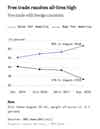Published
August 23, 2019
The negative consequences of tariffs include higher prices for consumers and businesses, retaliation by foreign governments, and a weakening of the global rules-based trading system that will surely harm U.S. interests greatly in the long run.
The U.S. Chamber of Commerce has been a consistent opponent of the recent proliferation of tariffs. In our view, tariffs are the wrong approach to resolving trade concerns, real or imagined: We even created a website dubbed www.thewrongapproach.com to detail their costs on a state-by-state basis.
A popular T-shirt summarizes the harm inflicted by tariffs well, explaining that they “not only impose immense economic costs but also fail to achieve their primary policy aims and foster political dysfunction along the way.”

But while tariffs are taxes levied on imports, the tariff war has also inflicted serious harm on U.S. exports.
It’s easy to see how exports contribute to the U.S. economy: 95% of the world’s consumers live outside the U.S., and selling them American-made goods and services supports growth and jobs here at home. Nearly half of U.S. manufacturing output is exported, and the proportion is similar for major agricultural commodities, such as wheat and soybeans. The U.S. also leads the world in services exports, which are growing 60% faster than goods trade.
Until recently, American exporters of goods and services had been accustomed to steady growth in their overseas sales. U.S. export growth averaged 6.5% over the 15-year-period of 1993-2007. After falling sharply in the great recession and then recovering, export growth had settled down to a rate of about 3% over the past decade.
However, since the tariff wars began in mid-2018, U.S. export growth has tanked, turning negative in the most recent quarterly data from the St. Louis Federal Reserve.

The trade war with China is a major driver of lost exports – leading China to raise its average tariff on U.S. goods from 3.1% in 2017 to 20% as of September 1, according to a report by the Peterson Institute for International Economics.
The results have been brutal. Earlier this year, the Institute of International Finance reported that the U.S.-China trade war is “costing the U.S. the equivalent of about $40 billion a year in lost exports,” according to a Bloomberg summary. China’s retaliatory duties led “to a collapse in many of the roughly 900 categories of targeted American products.”
One example is wine. TheLos Angeles Timesreports that U.S. wine exports to China were down by 33% in the first half of 2019 compared with the same period in 2017. The reason is simple: China has levied retaliatory tariffs of 93% on U.S. wine while competing shipments from Australia and Chile face duties of just 26%. TheLA Times notes:
“China was our fastest-growing export market,” said Honore Comfort, vice president for international marketing at the Wine Institute, a San Francisco trade group. “We were heavily ramping up our activities there, adding restaurant promotions and cultivating relationships with key retailers.”
… As the trade conflict drags on, “Chinese importers will buy from a different country,” she predicted. “We’ve worked on building those relationships for two decades. Now all of that time is basically a loss.”
Unfortunately, this lament is increasingly common among U.S. exporters, who have worked for years to develop relationships with customers in foreign markets. Once tariffs sever these ties, it may take years to recover lost ground.
But it isn’t just China. The U.S. has also imposed tariffs on imports of steel and aluminum from most countries around the world (in a notably positive move, they were rescinded for Canada and Mexico in May). Other countries have responded.
The EU retaliated against a wide range of U.S. goods, including a 25% tariff on U.S. whiskey. Reuters reports:
U.S. whiskey exporters are struggling to recoup lost sales after shipments to Europe plummeted 21% between June 2018 and 2019, according to data from the Distilled Spirits Council, a U.S. industry group…
Exports are a sizeable chunk of sales the U.S. whiskey industry, which generated $3.6 billion in revenue in 2018.
The Distilled Spirits Council said that 63% of U.S. whiskey exports have faced retaliatory tariffs from the European Union, China, Turkey, Canada and Mexico.
The harm import tariffs inflict on U.S. exports doesn’t only arise from foreign retaliation and lost export markets. Increasingly, a competitive exporter relies on imports for some key inputs. As tariffs drive up these production costs, the competitiveness of U.S. businesses suffers as firms are forced to raise prices. American-made goods can get priced out of global markets.
Indeed, a study by the U.S. Chamber and several other trade groups found that more than half of all imports are not for consumers but instead represent needed inputs for businesses. About 25% of all imports are raw materials, and another 45% are parts, components, and semi-finished materials. Many of these products are not available from domestic sources in sufficient quantities or at competitive prices.
It’s not surprising Americans have turned against tariffs. An NBC News/The Wall Street Journal poll conducted in August found that “nearly two-thirds of Americans say they support free trade with foreign countries,” which “represents a new high in the NBC/WSJ survey on this question, and it’s a 7-point increase from the last time it was asked in 2017.” Majorities of Democrats and Republicans now express favorable views toward free trade.

Similarly, an August Fox News poll found that 46% of Americans think imposing tariffs on imports hurts the economy, while just 29% think it helps. This 17% margin of difference against tariffs has increased from 11% in May and 6% in September 2018.
The conclusion is straightforward. Tariffs have hurt American workers, companies, and exporters, and the American people don’t support them. It’s past time to drop the tariffs.
About the author

John G. Murphy
John Murphy directs the U.S. Chamber’s advocacy relating to international trade and investment policy and regularly represents the Chamber before Congress, the administration, foreign governments, and the World Trade Organization.





